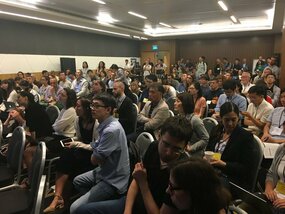|
By Tim van Mourik; Edited by Elizabeth DuPre The abstract reviews are in, and we're getting excited for OHBM's 25th annual meeting. Tim van Mourik has been chatting with Cameron Craddock about the history of the Open Science Room. Here he shares that history, his vision for Rome 2019, and asks for your priorities and interests via this survey.  Standing room only at the OHBM2018 Open Science Room Standing room only at the OHBM2018 Open Science Room As a member of the Special Interest Group on Open Science, I will be chairing the OHBM Open Science Room (OSR) this year. This is a room in which, during the main OHBM conference, topics related to open science are being discussed. The way I like to see it is that the main OHBM conference primarily focuses on the results of our scientific work, whereas the OSR is a place where we can focus on the process of doing science. In addition, it is a place for community discussion. Only last month a preprint on time-varying functional connectivity came out that had its roots in the OSR. After a Twitter conversation during the conference in Vancouver, the discussion was quickly moved to the OSR and eventually resulted in a collaborative manuscript. Although today the OSR is a place for new analysis methods and tools, discussions, and collaboration, it started out as a small space for hacking on code together. To learn more about this transformation, I interviewed Cameron Craddock on how the OSR came about and where it could go. Cameron is one of the founders of Brainhack, which he envisaged as a space for neuroscience researchers to code together and learn collaboratively. “After the first Brainhack in 2012, we wanted to bring this to a central place, to OHBM. The first Hackathon in 2013 was competitive in nature and took place during the conference.”
Following this initial success, the Hackathon was reconceived as a separate event preceding the conference. Making the Hackathon into a separate event encouraged a natural evolution: “We wanted to bring in more of the educational aspect to the conference. From this, the OSR emerged. It started out as an educational course: Brainhack 101. Besides lectures that provided handles for doing more reproducible science, there were ad hoc software demonstrations of open source tools.” The OSR started out with many ‘unconferences’: spontaneous and unrehearsed talks about personal ideas, questions, and suggestions. The low barrier-of-entry has always made it accessible to a wide range of people and has facilitated a better learning experience. The talks had a strong educational focus and highlighted the collaborative power of new open source tools. The mindset of the OSR has always been one of collaboration and empowerment to do open science. Answering questions like: “How can I best share my data?” and “What factors are most important for reproducibility?”. But as the OSR grew bigger, it started to get harder to maintain its spontaneity. I asked Cameron if the fact that it was so low-key is a bug or a feature: “It’s a shame to learn that you missed a talk because you didn’t know it was there, or that it overlapped with talks from the main program. It would be really useful to have this more organised in advance. But indeed, it is important to try and retain the same atmosphere. Spontaneity can be important for having better conversations.” As OSR chair, and with support from all the members of the Open Science Special Interest Group committee, I will be organising this year’s OSR at OHBM 2019, Rome. We have been thinking a lot about what we would like the OSR to be; how to be of value to the OHBM community as a complement to the main conference. It is clear that the OSR has an important educational role and that there is a strong focus on the adoption of open science best practices and technical solutions as a means of improving science. There is also an aspect of constructive discussion and community building to it. Parallel to the main conference, the OSR could be a place for discussing the problems of scientific work we encounter in our daily lives. Questions like: what are reasonable demands in terms of data and code sharing without it becoming a burden? What are the considerations if you want to publish ethically? How can we make sure that science is open for all? But maybe an even broader perspective could be beneficial. The process of doing science also concerns topics beyond just Open Science. Could the OSR also be a platform for discussing a wider range of topics, such as the ways in which science is done, evaluated, and funded, career perspectives in and outside a traditional university setting, and mental health challenges in academia. By covering these topics, the OSR could add a platform to the initiatives from the Student-Postdoc SIG as well. This way we can make the OSR the best experience for all. When I asked Cameron if there was any one thing he would want people to know about the OSR, his response was: “I firmly believe that everybody could get something out of the OSR & Hackathon!” And that is my personal mission for this year’s OSR. Within the Open Science Special Interest Group we have many ideas on what we could feature in the OSR. But we are also really interested in hearing what you would like to see. We would much appreciate if you could give us brief feedback about your experiences, hopes, and expectations for the OSR by completing this survey.
0 Comments
Your comment will be posted after it is approved.
Leave a Reply. |
BLOG HOME
Archives
January 2024
|
 RSS Feed
RSS Feed